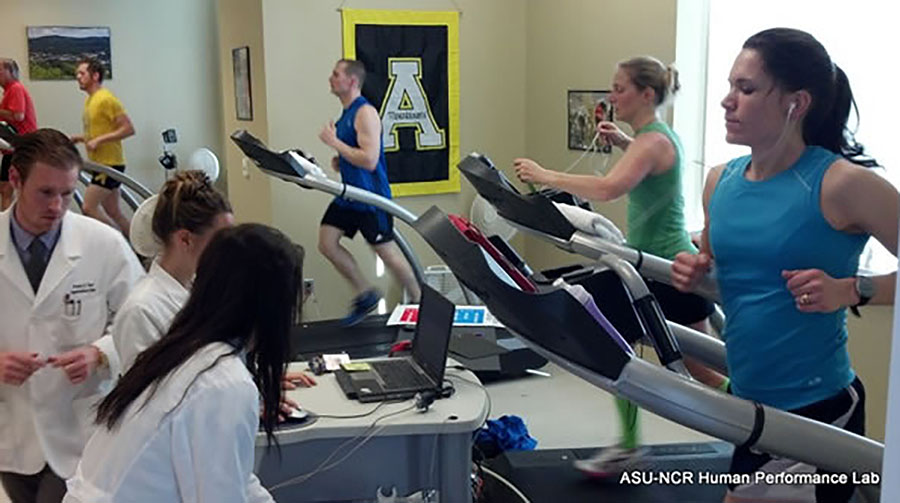KANNAPOLIS—A study published in the May edition of the journal Nutrients debunks the widely reported and accepted belief that chia seeds are a natural performance booster for athletes.
“It is all a bunch of hype and hope mixed together,” said David Nieman, DrPH, FACSM, lead author of the study titled “No Positive Influence of Ingesting Chia Seed on Human Running Performance.” Nieman is director of the Appalachian State University Human Performance Laboratory at the NC Research Campus (NCRC) in Kannapolis and a professor in Appalachian’s Donald C. Beaver College of Health Sciences.
Chia seeds are known as the food of long-distance runners like the ancient Aztec messengers and Tarahumara Indians of northwestern Mexico. Through books, the Internet and companies selling chia products, the belief has grown that consuming chia seed is the reason for their ability to run hours and even days at a time. The ensuing chia craze elevated the ancient seed to a “superfood” that promises spectacular benefits for athletes.
“Chia is a very nutritious food that athletes should include in their diet,” Nieman emphasized, noting that the seeds are rich in alpha-linolenic acid (ALA), an essential omega-3 fatty acid, as well as fiber, vitamins and minerals. “However, our research shows that any athlete taking in chia seed oil during or before a run should not expect a benefit. The ALA in chia seeds is not used by the working muscle during intense exercise. The muscles prefer carbohydrate.”
Chia myth to truth
Nieman is a veteran marathon runner who initiated the study hoping to confirm the benefits of chia seed for athletic performance. He hypothesized that chia would provide a source of “sustained energy to help the athletes go longer” after their initial carbohydrate stores were depleted.
Nieman tested 24 male and female runners ages 24 to 55 using a randomized, crossover approach. The runners reported to his lab twice in an overnight fasted state at least two weeks apart. After providing an early-morning blood sample, they ingested either 0.5 liters flavored water alone or 0.5 liters of water with chia seed oil. Since ALA from the chia seeds enters the bloodstream through the intestine within two hours after ingestion, the athletes waited a half hour before providing a second blood sample and then running to exhaustion at a marathon pace. They gave additional blood samples immediately post-exercise and one hour later.
The analysis showed that plasma ALA levels spiked three times higher than normal when the athletes consumed chia seed oil in water, but that run time to exhaustion, other performance indicators and exercise-induced inflammation did not differ when the same athletes drank flavored water. In fact, no differences were found in any marker tested, such as respiratory exchange ratio, which is an indicator of the type of fuel used by the muscles, oxygen consumption or plasma glucose.
“When the athletes were running near marathon race pace, we found absolutely no effect on performance when they had the chia seed oil,” Nieman said. “Some think that omega-3 asserts anti-inflammatory effects, and we found no influence from chia seed oil on exercise-induced inflammation either.”
Additional chia research
This study was conducted in partnership with funding from the Dole Nutrition Institute (DNI), also at the NCRC. Nieman and Nicholas Gillitt, PhD, vice president of nutritional research and director of the DNI, collaborated on two previous chia seed studies. In the first, published in The Journal of Alternative and Complementary Medicine, they found that chia seed had no effect on markers for disease.
In the second, published in the journal Plant Foods for Human Nutrition, they found that the bioavailability of ALA in chia seed only occurs in milled seed, meaning that ALA is not bioavailable from the whole seed. This prompted the food company to reformulate its line of chia products to incorporate the milled seed to enhance the nutritional value for Dole customers.
“Dole was very excited about the potential of chia seed to provide a plant-based source of omega 3 fatty acids to the human diet,” Gillitt said, “but there is lots of hype surrounding chia seed. We feel our consumers deserve the truth. So we looked for it.”
“There are a lot of people out there that think chia seed has special abilities to improve their health very quickly, and none of that is true,” Nieman emphasized. “Chia is a very nutritious food. It is very similar to other nuts and seeds with the same nutrient makeup. There is just nothing magical about its ability to improve health or athletic performance.”
As for the astounding running prowess of the Aztec messengers and Tarahumaras? Nieman pointed to research showing that their diets are very high in carbohydrates with 90 percent coming from corn and beans, and, he added, “This is an ideal diet for runners.”
About Appalachian State University
As a premier public institution, Appalachian State University prepares students to lead purposeful lives. App State is one of 17 campuses in the University of North Carolina System, with a national reputation for innovative teaching and opening access to a high-quality, cost-effective education. The university enrolls more than 21,000 students, has a low student-to-faculty ratio and offers more than 150 undergraduate and 80 graduate majors at its Boone and Hickory campuses and through App State Online. Learn more at https://www.appstate.edu.
What do you think?
Share your feedback on this story.





![How NCInnovation Is Rethinking Economic Development in North Carolina [faculty featured]](/_images/_posts/2026/02/rethinking-economic-development-600x400.jpg)






